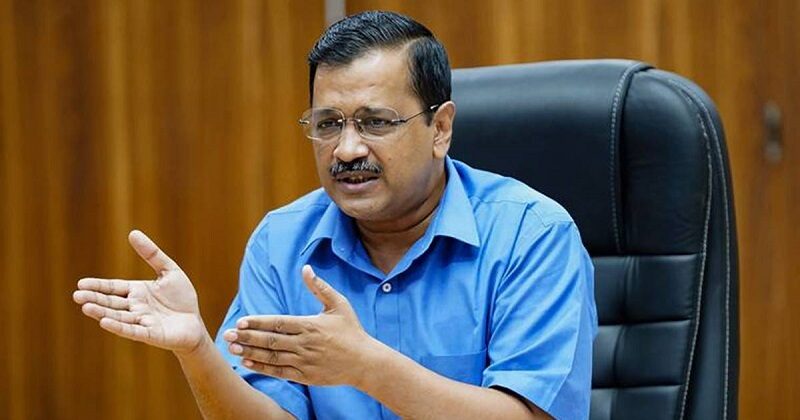
New Delhi: Delhi Chief Minister Arvind Kejriwal said on Monday that the pollution levels have dipped in the city in the last eight years despite swift pace of development and the construction of schools, hospitals and flyovers.
Addressing a gathering at Thyagaraj Stadium on the occasion of World Environment Day, he asserted that both PM 2.5 and PM 10 levels ‘fell by 30 per cent’ in 2022 compared to the figures in 2016. Whenever development happens, it is accompanied by pollution due to the felling of trees, road construction, and kicking of dust, among others, he said. ‘In Delhi, the pace of development has not gone down in the last eight years. Schools, hospitals and flyovers are being constructed’, Kejriwal said, adding work on development has taken place at a swift pace. ‘But, the pollution level has dipped in this period’, he said.
Sharing data, he said in 2016, on 26 days, pollution level was ‘very bad’ when the city was ‘akin to a gas chamber’ with grey skies and bad air. In 2022, only six such days were there, he said. In 2016, on 109 days, the pollution level was ‘low with clear sky’ and ‘very good air outside’, but in 2022, the number of such days were 163, he said. In his address, the chief minister also said that the tree cover percentage (of total land area) in the city has risen to 23 per cent today from 20 per cent in 2013.
Led by the United Nations Environment Programme (UNEP) and held annually on June 5 since 1973, World Environment Day is the largest global platform for environmental public outreach, and is celebrated by millions of people across the world, the UN says on its website. Kejriwal, in his address, said it has been 50 years of World Environment Day celebrations. And, in these 50 years, pollution has ‘increased in every city, village and locality’, but it has gone down in Delhi, ‘as we have worked with 2 crore people of the city and taken a number of measures to mitigate pollution’. In an impassioned plea, he called upon the people of Delhi to transform the fight against pollution into a ‘jan andolan’ (people’s movement).
Meanwhile, the Leader of Opposition in Delhi Assembly, Ramvir Singh Bidhuri, in a statement, dismissed Mr Kejriwal’s claiming credit for reducing pollution in the national capital. The BJP leader alleged that the condition of Delhi’s roads is ‘very poor’, and the deteriorating state of public transportation is contributing the most to pollution. ‘The government has not taken any steps to clean the Yamuna River. If pollution has decreased in Delhi, it is only possible due to the efforts of the central government’, Bidhuri claimed.
Earlier in his address, Kejriwal said, ‘We often hear in the news that the pollution caused, particularly during winter season, is because of the burning of farm stubble. So, to tackle this problem, the state government collaborated with the PUSA Institute and came up with a chemical that is now being used by nearly all farmers within Delhi. ‘An area of around 5,000 acres is within cultivation in Delhi and all the farmers here now use this liquid that eliminates the need to burn stubble. Therefore, none of this pollution now originates from Delhi’, he said.
Kejriwal said initially most of this stubble-burning-induced pollution originated from the fields of Punjab. But in the last year since the AAP-led government has been formed in the state, there has been a ‘30 per cent decline’ in the level of pollution that originates there. ‘The Punjab government has started several initiatives to tackle this problem and we are very hopeful that this year, the amount of pollution will further decline. It will take a couple of years to completely eliminate this problem. But the actions taken by the state government in Punjab give us adequate hope that the pollution this year will be much lower’, he said.
The AAP leader also highlighted other initiatives taken by the Delhi government to combat pollution, including tree transplantation, implementation of piped natural gas (PNG) in industries, and utilisation of Real-Time Source Apportionment Technology. Moreover, the government has identified and is actively working on 13 pollution hotspots in the city.
He also mentioned the implementation of the ‘Yuddh Pradushan Ke Virrudh’ campaign. Also, the Delhi government has set an ambitious target of planting 52 lakh saplings this year, demonstrating its determination to foster a greener and healthier future for all, he said.
Mr Kejriwal also pointed out that the firecracker ban in Delhi has been immensely successful after some opposition to it in the beginning. On the ‘Green Delhi’ application, he said, ‘Until now, 58,000 complaints have been registered on the app, and 90 per cent of these problems have been addressed’. ‘We are also in the process of turning Delhi into a ‘city of lakes’. And, 380 such lakes surrounded by greenery will be made eventually all over Delhi. Twenty-six such lakes have been made until now and I have visited some of them’, Kejriwal was quoted as saying in a statement issued by the Delhi CM’s office. ‘I also visited a lake in Dwarka and the water level there has risen by 5 m or so, so the water table is higher here. I do not think the residents of Dwarka will face any issues of water shortage at all now’, he said.
During the event, a street play was performed to raise awareness about the pollution caused by plastic, and a group presented a song dedicated to environment. A short film on environment was also screened. At the end of the event, representatives of eco clubs, RWAs, and forest guards who have been actively involved in improving the environment were awarded certificates. The event was attended by Delhi Environment and Forests Minister Gopal Rai, local legislators, and other senior officials of the department.

Post Your Comments